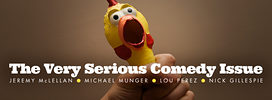Well, gosh. In this month’s Cato Unbound someone tried to have some fun, someone else decided that no one deserves to have fun, and a big fuss broke out. And, as usual, it’s because everyone pretty much agrees, so tiny points of doctrine and imagined slights assume exaggerated importance.
We libertarians really get upset at heretics. Which is why we spend so little time worrying about infidels: we’re too busy fighting with our friends.
Now, there is something comedic about that, I admit. To outsiders, our inability to do something as simple as having a light-hearted “April Fools Day” exchange without a reversion to a Hobbesian war of all against all is likely hilarious. Readers probably have a “That’s funny…but not really” reaction, because it’s hard to imagine why people insist on fighting.
The problem is that it is hard to put yourself in the other person’s position, and think about their perspective. Which made me think of another “That’s funny…but not really” kind of piece: Mark Twain’s “War Prayer,” which seems to endorse a little disagreement as being good for society. As Twain puts it:
It was a time of great and exalting excitement. The country was up in arms, the war was on, in every breast burned the holy fire of patriotism… daily the young volunteers marched down the wide avenue gay and fine in their new uniforms… nightly the packed mass meetings listened, panting, to patriot oratory with stirred the deepest deeps of their hearts, and which they interrupted at briefest intervals with cyclones of applause, the tears running down their cheeks the while; in the churches the pastors preached devotion to flag and country, and invoked the God of Battles beseeching His aid in our good cause in outpourings of fervid eloquence which moved every listener.
It was indeed a glad and gracious time, and the half dozen rash spirits that ventured to disapprove of the war and cast a doubt upon its righteousness straightway got such a stern and angry warning that for their personal safety’s sake they quickly shrank out of sight and offended no more in that way.
Anybody who disagrees with a general orthodoxy had better be careful. Don’t want to upset anyone, especially when they are all so sure. But then, Twain says, a strange old man, a figure clad in white, went to the altar and interrupted the prayer cum rally. The stranger warned the fervent and the pious that their own prayer was actually blasphemous. By praying for victory over their enemies the people were also asking for the things that vanquishing an enemy requires. According to the strange man, their real prayer was:
O Lord our God, … help us to drown the thunder of the guns with the shrieks of their wounded, writhing in pain; help us to lay waste their humble homes with a hurricane of fire; help us to wring the hearts of their unoffending widows with unavailing grief; help us to turn them out roofless with their little children to wander unfriended in the wastes of their desolated land in rags and hunger and thirst.
Twain concludes in a way that might very well serve to describe today’s comic who questions political orthodoxy:
It was believed afterward that the man was a lunatic, because there was no sense in what he said.
Funny stuff, but sometimes the audience just doesn’t get it.

